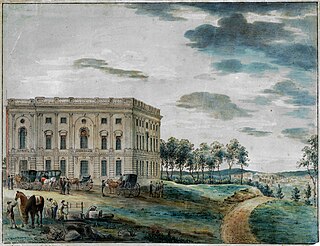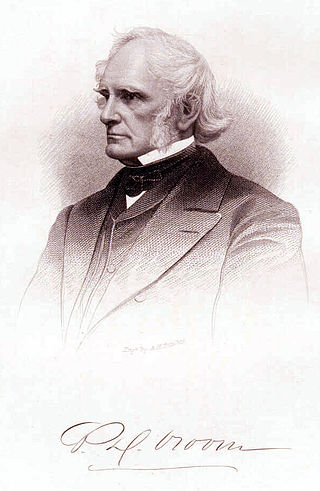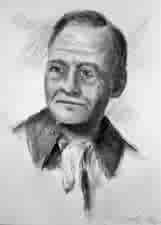
The 10th United States Congress was a meeting of the legislative branch of the United States federal government, consisting of the Senate and the House of Representatives. It met in Washington, D.C., from March 4, 1807, to March 4, 1809, during the seventh and eighth years of Thomas Jefferson's presidency. The apportionment of seats in the House of Representatives was based on the 1800 census; both chambers had an overwhelming Democratic-Republican majority.

The 11th United States Congress was a meeting of the legislative branch of the United States federal government, consisting of the United States Senate and the United States House of Representatives. It met in Washington, D.C. from March 4, 1809, to March 4, 1811, during the first two years of James Madison's presidency. The apportionment of seats in the House of Representatives was based on the 1800 United States census. Both chambers had a Democratic-Republican majority.

The 1808–09 United States House of Representatives elections were held on various dates in various states between April 26, 1808, and May 5, 1809. Each state set its own date for its elections to the House of Representatives before the first session of the 11th United States Congress convened on May 22, 1809. They coincided with James Madison being elected as president. Elections were held for all 142 seats, representing 17 states.

The 1806–07 United States House of Representatives elections were held on various dates in various states between April 29, 1806 and August 4, 1807. Each state set its own date for its elections to the House of Representatives before the first session of the 10th United States Congress convened on October 26, 1807. They occurred during Thomas Jefferson's second term. Elections were held for all 142 seats, representing 17 states.

Peter Dumont Vroom, an American Democratic Party politician, served as the ninth governor of New Jersey and as a member of the United States House of Representatives for a single term, from 1839 to 1841.

Ephraim Bateman represented New Jersey in the United States Senate from 1826 to 1829 and in the United States House of Representatives from 1815 to 1823.
George Bryan Cooper was a politician from the U.S. state of Michigan.

The 1808–09 United States Senate elections were held on various dates in various states, coinciding with the 1808 presidential election. As these U.S. Senate elections were prior to the ratification of the Seventeenth Amendment in 1913, senators were chosen by state legislatures. Senators were elected over a wide range of time throughout 1808 and 1809, and a seat may have been filled months late or remained vacant due to legislative deadlock. In these elections, terms were up for the senators in Class 1.

The 1808 United States House of Representatives elections in New York were held from April 26 to 28, 1808, to elect 17 U.S. Representatives to represent the State of New York in the United States House of Representatives of the 11th United States Congress. At the same time, a vacancy was filled in the 10th United States Congress.

The 1810 United States House of Representatives elections in New York were held from April 24 to 26, 1810, to elect 17 U.S. Representatives to represent the State of New York in the United States House of Representatives of the 12th United States Congress. At the same time, a vacancy was filled in the 11th United States Congress.

A special election was held in New Jersey's at-large congressional district on March 8, 1808 to fill a vacancy left by the death of Ezra Darby (DR) on January 27, 1808

The 1808 United States Senate election in Pennsylvania was held on December 13, 1808. Michael Leib was elected by the Pennsylvania General Assembly to the United States Senate.
A special election was held in Vermont's 1st congressional district on September 6, 1808 to fill a vacancy caused by the resignation of James Witherell (DR) on May 1 of the same year, to accept a position as judge of the Supreme Court of Michigan Territory.

The 1808 United States elections elected the members of the 11th United States Congress. The election took place during the First Party System. In the aftermath of the Embargo of 1807, the Federalists picked up congressional seats for the first time since their defeat in the 1800 election. However, the Democratic-Republican Party maintained control of the presidency and both houses of Congress.
New Bedford is an unincorporated community located within Wall Township in Monmouth County, in the U.S. state of New Jersey.

The 1808 United States presidential election in Vermont took place between November 4 and December 7, 1808, as part of the 1808 United States presidential election. The state legislature chose six representatives, or electors to the Electoral College, who voted for President and Vice President.

The 1808 United States presidential election in New Jersey took place between November 4 and December 7, 1808, as part of the 1808 United States presidential election. The state chose eight representatives, or electors to the Electoral College, who voted for President and Vice President.












